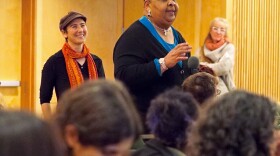In 1966 in Oakland California, Huey Newton and Bobby Seale founded the Black Panther Party for Self Defense. The initial goal was to monitor police violence in black communities, a persistent issue that Black Lives Matter and other contemporary groups continue to organize around today. In 1969, community social programs became a core activity of party members. The Black Panther Party launched multiple programs such as a free breakfast program for children, food banks, health clinics and education outreach.
The membership rapidly grew to 5,000 full-time party workers, organized in 45 branches across the United States and had international branches. At their peak, they sold 250,000 papers of “The Black Panther” every week. The government reaction to their positive impact can only be measured by the destructive forces that were unleashed. FBI director J. Edgar Hoover called the party “the number one threat to the internal security of the United States.” He supervised an extensive program named Cointelpro using tactics of surveillance, infiltration, perjury, police harassment and assassination of Black Panther Party members.
Women played an instrumental role in shaping the black power movement. By the early 1970s women made up two-thirds of the organization’s membership. Women members challenged the traditional female roles of caregiver and homemaker, expanding the ways in which women could contribute to the organization as warriors, orators, organizers and collaborators. They were some of the strongest, loudest and most relentless members.
Barbara Easely Cox was a member of the Black Panther Party from 1967 to 1971. She and her husband were leaders of the Oakland branch and she also worked in New York and Philadelphia chapters. She helped spread the message and reach of the Black Panther Party internationally, first moving to Algiers and then North Korea where she gave birth to her son. After she left North Korea, Barbara moved to Germany on her own, where she put out a newspaper and worked with soldiers from the Vietnam War. Later, Barbara returned to her hometown Philadelphia and contributed the wealth of her experiences as a social worker focusing on community development work. Her commitment to help people forms her core being as she says “If I can help one young person to forge forward, keep the faith, give strength to or clear up his/her direction, I live to do the job.”
Barbara adamantly believes that the Black Panther Party was not about violence, it was about growing, “getting rid of drugs, respecting elders, going to school…it was something positive, focused on the growth of a people.”
What is the legacy of the Black Panther Party? Barbara says “Our legacy is also the legacy of everyone back to the first slave that came to America. We were just another link in history that builds on someone else’s struggles. That culture of resistance, it’s all around the world, and occasionally you’ll hear somebody mention the Black Panther Party as an influence, because they read or heard about it or saw a movie. Youth will pick up that culture of resistance, and learn how to interpret politics and community work based on that. Take what you need to progress.”
[This article originally appeared at the Through The Eyes of Women blog.]




